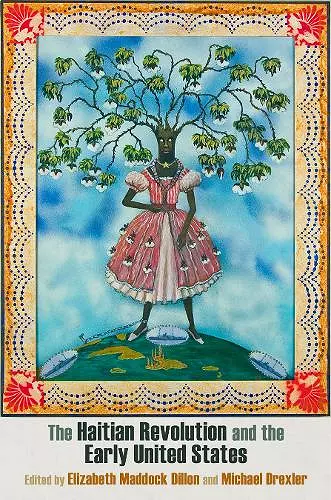The Haitian Revolution and the Early United States
Histories, Textualities, Geographies
Elizabeth Maddock Dillon editor Michael Drexler editor
Format:Hardback
Publisher:University of Pennsylvania Press
Published:30th May '16
Currently unavailable, and unfortunately no date known when it will be back

When Jean-Jacques Dessalines proclaimed Haitian independence on January 1, 1804, Haiti became the second independent republic, after the United States, in the Americas; the Haitian Revolution was the first successful antislavery and anticolonial revolution in the western hemisphere. The histories of Haiti and the early United States were intimately linked in terms of politics, economics, and geography, but unlike Haiti, the United States would remain a slaveholding republic until 1865. While the Haitian Revolution was a beacon for African Americans and abolitionists in the United States, it was a terrifying specter for proslavery forces there, and its effects were profound. In the wake of Haiti's liberation, the United States saw reconfigurations of its geography, literature, politics, and racial and economic structures.
The Haitian Revolution and the Early United States explores the relationship between the dramatic events of the Haitian Revolution and the development of the early United States. The first section, "Histories," addresses understandings of the Haitian Revolution in the developing public sphere of the early United States, from theories of state sovereignty to events in the street; from the economic interests of U.S. merchants to disputes in the chambers of diplomats; and from the flow of rumor and second-hand news of refugees to the informal communication networks of the enslaved. The second section, "Geographies," explores the seismic shifts in the ways the physical territories of the two nations and the connections between them were imagined, described, inhabited, and policed as a result of the revolution. The final section, "Textualities," explores the wide-ranging consequences that reading and writing about slavery, rebellion, emancipation, and Haiti in particular had on literary culture in both the United States and Haiti.
With essays from leading and emerging scholars of Haitian and U.S. history, literature, and cultural studies, The Haitian Revolution and the Early United States traces the rich terrain of Haitian-U.S. culture and history in the long nineteenth century.
Contributors: Anthony Bogues, Marlene Daut, Elizabeth Maddock Dillon, Michael Drexler, Laurent Dubois, James Alexander Dun, Duncan Faherty, Carolyn Fick, David Geggus, Kieran Murphy, Colleen O'Brien, Peter P. Reed, Siân Silyn Roberts, Cristobal Silva, Ed White, Ivy Wilson, Gretchen Woertendyke, Edlie Wong.
"This deeply impressive interdisciplinary collection reckons with the "accidents" occasioned by the Haitian Revolution, positioning them in relation to the developing United States. . . . The volume both adds to a long neglected historiographical narrative and gestures toward an alternative American canon shadowed by the missed potentialities of the Haitian Revolution." * Critical Inquiry *
"This is an amazing collection of essays-beautifully conceived and organized, nuanced and sophisticated. A great collection for teaching as well as a superb resource for future research." * Anna Brickhouse, University of Virginia *
"The novelty of The Haitian Revolution and the Early United States lies in its multidisciplinary approach. No other work brings together such a diverse collection of essays by such esteemed academics." * Matthew J. Clavin, University of Houston *
ISBN: 9780812248197
Dimensions: unknown
Weight: unknown
432 pages